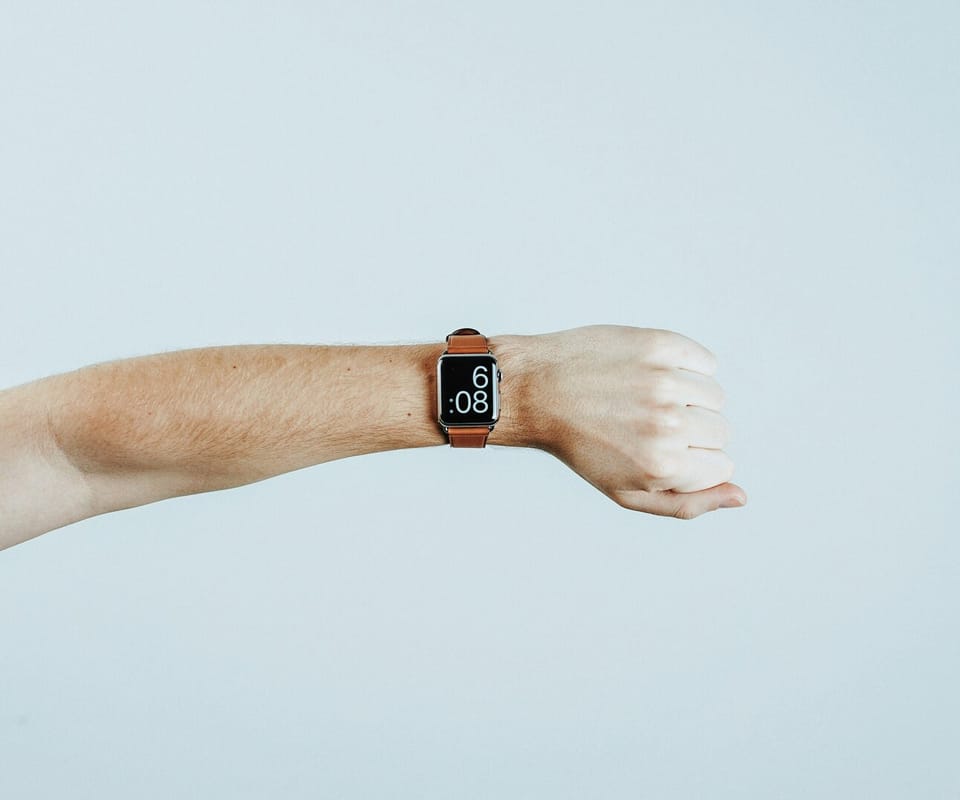Why I Gave Up My Smartwatch

Somewhere between the first time I tapped my wrist to skip a song and the three hundredth time I anxiously checked my resting heart rate, I started to hate my Apple Watch.
The promise of the smartwatch was elegance, convenience, optimization. What I got was constant data drip, subtle panic, and the faint sense that my pulse belonged to someone else.
I bought my smartwatch like most people do: for health. I wanted to track my sleep, move more, maybe train for a 10K. I had just read about behavioral feedback loops, and I believed, earnestly, that quantified nudges would shape better habits. The promise of self-knowledge through numbers has always had a kind of rationalist glamour.
It feels like wisdom.
But wisdom isn’t meant to be a feeling.
The Tyranny of Metrics
Michel Foucault once described the modern subject as a self-surveying creature. Bent over spreadsheets, calorie counters, and productivity graphs, we monitor ourselves with the vigilance once reserved for prison guards. The smartwatch is simply the most intimate upgrade of that tendency: a panopticon you clasp on willingly every morning.
At first, it’s exciting. You learn how long you sleep, how fast your heart beats, how many steps you walk. But knowledge invites expectation. And expectation breeds disappointment. A night of rest that feels refreshing gets downgraded by your sleep score. A jog becomes unsatisfying if the zone chart looks too flat. Even sitting still can trigger a guilt-inducing vibration to "stand up and move."
Eventually, I stopped responding to my body. I was responding instead to a dashboard.
William James once said that the faculty of voluntarily bringing back a wandering attention, over and over again, is the root of judgment, character, and will. It’s also the thing the smartwatch systematically erodes. It pings. It buzzes. It gives you little taps, like a child tugging on a sleeve. And each tap is a fork in the road: attend to your body, or attend to your device? This conflict isn’t always conscious, which is what makes it so dangerous. You lose the thread without realizing it. You forget what the body felt like before it was measured.
There’s a reason monks don’t wear Apple Watches.
The Illusion of Control
The promise of quantified self is that if you can measure it, you can manage it. But there’s a trap buried in that logic. Measurement is selective. The smartwatch tracks what’s easy to quantify. Heart rate? Yes. Stress? Only as a proxy. Joy? No chance.
You end up managing the metrics, not the reality. You sleep longer, but feel exhausted. You hit 10,000 steps, but your knees ache. You meet every daily goal, and yet somehow, you feel like you’ve failed. This is not optimization. It’s simulation. It’s Borges’ map at 1:1 scale: impressive, but useless for navigation.
Hannah Arendt warned that modernity risks reducing human life to biological labor — necessary, repetitive, and unfree — subordinating our capacity for action to the imperatives of productivity and survival. The smartwatch seems to fit neatly into that worldview. It reduces the body to its output: steps walked, calories burned, zones entered.
And that changes how you live in it. You start to ignore signals that don’t show up in your stats. You push through fatigue because the recovery index says you’re "ready." You stop asking how you feel and start asking how you’re performing. Before long, your body is not you. It’s your employee.
The economist Charles Goodhart coined a rule: when a measure becomes a target, it ceases to be a good measure. Once your sleep score becomes the goal, it distorts your experience of rest. Once your step count becomes a benchmark, it overrides internal cues. Once your resting heart rate becomes a trophy, anxiety about maintaining it ruins the whole game.
I used to think I was chasing insight. Now I realize I was chasing compliance. The smartwatch didn’t make me more self-aware. It made me more obedient.
The Return to Intuition
I stopped wearing the watch a few weeks ago. It sat on my desk for a day. Then two. Eventually, I put it in a drawer. I didn’t miss it.
What returned: a sense of calm. I could go to sleep without being scored. I could go for a walk without a badge. I started noticing things again - how I feel after coffee, the way my breath slows near water.
I’m not against data. I still wear a basic analog Swatch watch - the X edition, made famous by the straight edge punk bands who were formative to my teenage years, who I rediscovered after embracing sobriety. But I don’t track my workouts. When I run, I run till I sweat and become tired. When I sleep, I sleep when my eyes feel heavy and I wake up when my alarm clock pings.
I don’t want a relationship with my body to be mediated by a feedback loop designed in Cupertino or anywhere else.
I want to feel my own rhythms again.
Maybe this is an odd hill to die on. The smartwatch is small, ubiquitous, and relatively harmless. But in a culture increasingly obsessed with surveillance, metrics, and behavioral control, choosing to opt out - even slightly, even marginally - isn’t trivial.
I want to preserve a space for messiness. For hunches. For listening without interpreting. For knowing without counting.
In Homer’s Iliad, Cassandra could see the future but was cursed that no one would believe her warnings. Smartwatches seem to carry the opposite curse—they constantly warn us about things that don’t matter (step counts, heart rate dips, notification badges) while we’re compelled to believe every alert is urgent.
We’ve been living under the false prophecy of optimization, treating every buzz as divine wisdom. Time to stop listening to the oracle that only speaks in meaningless metrics.